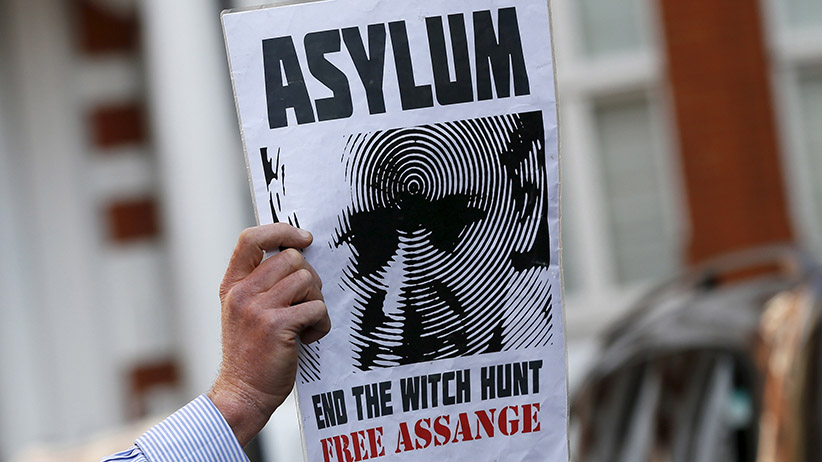Amid an immigration crisis, Julian Assange asks for asylum
Leah McLaren on how WikiLeaks founder Julian Assange’s plea for protection in France couldn’t have come at a worse time
A supporter of Wikileaks founder Julian Assange holds a placard during a gathering outside the Ecuador embassy in London, Britain June 19, 2015. Stefan Wermuth/Reuters
Share

Of all the desperate migrants seeking asylum in Europe last week in the hope of a better life, Julian Assange was perhaps the least sympathetic.
In a summer that’s seen thousands of migrants drowning in the Mediterranean off the shores of Italy and Greece, and, more recently, storming the Calais tunnel for passage into the U.K., Assange’s open letter to President François Hollande, printed last week in Le Monde, hit a distinctly off note. The Australian WikiLeaks founder has been living in the Ecuadorian Embassy in London since 2012, when prosecutors in Sweden announced they wanted to question him for alleged sex crimes, including rape, sexual molestation and illegal coercion.
Assange denies the allegations (no formal charges have been made) and says the European warrant for his arrest is, in fact, part of an extensive plot by American authorities to have him extradited to the U.S., where he could be tried for treason. In his letter to Hollande, Assange stated that his life was in danger, and that,“by welcoming me, France would carry out a humanitarian and symbolic gesture, sending encouragement to every journalist and whistleblower.”
According to the letter, his request was prompted by an invitation to visit France from a group of French civil rights activists backed by French Justice Minister Christiane Taubira. In June, Taubira told French news channel BFMTV that she “absolutely would not be surprised” if France granted asylum to both Assange and National Security Agency (NSA) whistleblower Edward Snowden, currently living in Russia. She added that it would be a “symbolic gesture,” in part motivated by the NSA’s sweeping surveillance of three French presidents.
Yet Assange’s plea was not well-received at the highest levels of French government. The French president’s office responded immediately with an unequivocal smackdown. “The situation of Mr. Assange does not present any immediate danger,” the statement read. “Furthermore, he is subject to a European arrest warrant.”
In a head-scratching (and hair-splitting) turn of events, Assange’s legal team responded by saying that he hadn’t actually made any request at all. Baltasar Garzón, the head of his defence team, told the British media that Assange’s letter had not been a request for asylum, but an expression of his willingness “to be hosted in France if, and only if, an initiative was taken by the competent authorities.”
But reading the letter, it seems awfully clear that Assange was hoping for the same protection once extended to that other high-profile accused rapist, the American director Roman Polanski. Assange describes himself as a “journalist pursued and threatened with death by the United States authorities” (though he does not give evidence of the alleged death threats). He links the claim to the 2010 WikiLeaks release of a classified video leak by the soldier Chelsea Manning (a male-to-female transsexual then-named Bradley). The video showed a series of ground-to-air strikes by American forces against unarmed Iraqis that ended up killing 18 civilians, including two Reuters journalists. (In 2013, Manning was charged and convicted of offences under the U.S. Espionage Act and sentenced to 35 years in prison.)
In an extra twist, in his open letter, Assange added that his youngest child, whom he hasn’t seen in five years (and whose sex he will not specify), lives in France with the child’s mother. “I have had to keep their existence secret up to today, in order to protect them,” he wrote. Assange has long been rumoured by tabloids to have fathered several children around the world. According to the book WikiLeaks: Inside Julian Assange’s War on Secrecy by Guardian journalists Luke Harding and David Leigh, Assange was enamoured with the idea of impregnating the many women he slept with, and balked at the idea of contraception.
According to the European arrest warrant, he is accused of raping a 26-year-old Swedish woman whom he “improperly exploited” because she, “due to sleep, was in a helpless state.” According to Swedish statutes of limitation, prosecutors only have until August to question Assange about the crimes of which he’s accused. But they also have until 2020 to investigate the most serious allegation of rape.
He remains in the Ecuadorian Embassy, but has said he is planning to leave “soon.” Two members of London’s metropolitan police force are continually on guard outside the Embassy, in case he decides to do so. Earlier this year, Scotland Yard confirmed that policing Assange has so far cost the British taxpayers almost $20 million.